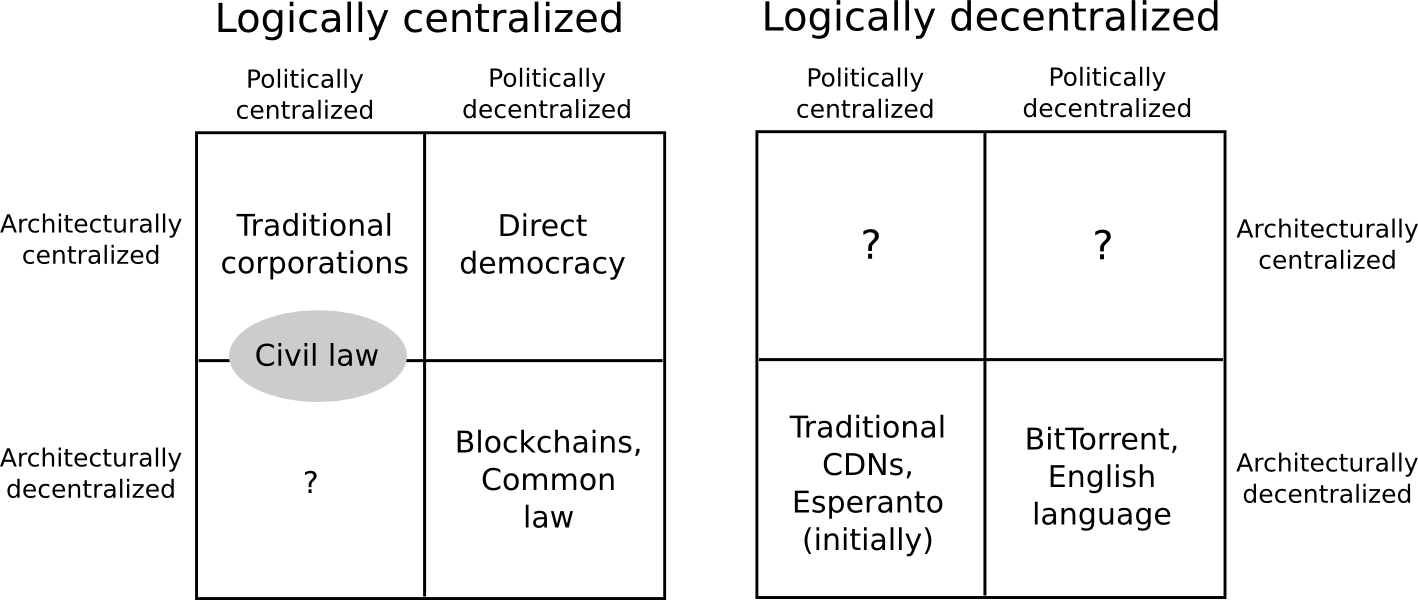## Principles Seminar v0
**Session 5 - Decentralization (people)**
Oskar, 2018-10-11
---
## VII. Decentralization (people)
> We minimize centralization across both the software and the organization itself. In other words, we maximize the number of physical computers composing the network, and maximize the number of individuals who have control over the system(s) we are building.
---
## Big topic
- Wall of shame generation
- Small selection: agency, localism, scale, consensus, money problem
- People and computers are both nodes in network
---
## centralization (n.)
> "concentration of administrative power in the central government at the expense of local self-government," -- Etymonline
---
## Localism and self-governance/sovereignty
- For users and contributors
- Voting is _one way_ to remove centralization
- But global vote not local self-governance
- Risk losing control of your own affair
---
## When consensus?
- Blockchains don't force consensus about how _you_ spend your money.
- When do we need consensus and how can we ensure it happens at the most local level?
---
## The money problem
- "Do what I want" - yes, great
- Except: What is A paying B for exactly?
- Tenure model untenable with structural ideals
- Not all work is of equal value to the network
- What's a decentralized solution?
---
## Existing solution: Market as the ultimate p2p
- Agents pay for services (contracts)
- No central source of fund
- Funding of public goods hard problem but possible
- Status multisig as amplifier/seed funds
- Who are the agents?
---
## A question of scale
- Different dynamics at different scale levels.
- Individuals, small groups (<10 people), medium group (<150 people), and beyond.
- All behave _qualitatively_ differently (trust, overhead cost)
---
## Examples of scales
- City states want thriving commerce and don't have resources to go to war, but empires have armies and want to use them. ~ NNT
- A local mayor cares about the fountain in their village, not about meddling in economy to "stabilize it" with bail-outs. ~ NNT
- Read Szabo on social scalability for Blockchain/Status application
---
## Bigness and fragility
> Wherever something is wrong, something is too big - Leopold Kohr
- Size and centralization - fragile to uncertainty
- One central policy mistake huge impact
- Status is inherently about being robust and antifragile to uncertainty in this domain
---
## What does this have to do with Status scale?
- ~100 people, company structure seems fine?
- Want sustainable structure
- This is more important and urgent than it seem
- Tension and friction at this point bad
- Self-consistency is necessary for survival
- Example: compensation end of year and iterating towards solving the money problem; people leads
---
## ...and beyond
What will it take to get us to to be a top OSS project? 100-1000 monthly active contributors, and beyond?
How do we shift our thinking to being more like stewards and maintainers, and _actively_ get more people to contribute?
No shortage of work - amazing opportunity with SNT that we are wasting right now
---
## Cryptoeconomic variables
- Priviliges (commit bit, decision making, etc)
- And rewards ($)
- Flip side for punishments: especially with staking $ (CCs?)
---
## Ways forward?
1. Small win-win bottom-up experiments a la SITG
-- q: what is stopping people from DAONAO?
3. DAO with LLC as agent and service model, fork
-- e.g. liquid pledging and proposals
4. Also voting for soft signaling of decisions
-- see OKR process, wall of shame (community), perf review (?)
---
## Litmus test
- LLC gone, multisig gone, Status still operating effectively with new initiatives. How?
- (Also, all core contributors who joined in 2018 or before are gone.)
---
## Appendix: What the DAO

(From [Ethereum blog 2014](https://blog.ethereum.org/2014/05/06/daos-dacs-das-and-more-an-incomplete-terminology-guide/))
Bitcoin as a DAO? Just one model.
---
## Appendix: Decentralize matrix

Again [Vitalik](https://medium.com/@VitalikButerin/the-meaning-of-decentralization-a0c92b76a274)
---
## Thanks
Join #status-dao
{"metaMigratedAt":"2023-06-14T18:24:02.454Z","metaMigratedFrom":"Content","title":"Untitled","breaks":true,"contributors":"[{\"id\":\"87bf749a-9a51-43dd-8c18-1ff87c4baaab\",\"add\":10847,\"del\":6546}]"}